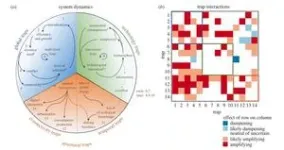(Press-News.org) Short-term increases in air pollution can cause problems for a lot of people, but especially to those with diagnosed or undiagnosed heart disease. But it’s not just a potential issue for pollution coming from cars and industrial processes.
New research from Intermountain Health in Salt Lake City shows that pollutants trapped in lower, colder layers of air in mountain-region communities present sometimes higher risk for this population, while wildfire smoke from often distant locales may also impact risk.
“We’re finding that air pollution is affecting different people, in different ways, in different seasons,” said Benjamin Horne, PhD, a professor of research and director of cardiovascular and genetic epidemiology at Intermountain Health. “This study reinforces that, if someone is having chest pains, they should go to the hospital, no matter what season it is.”
Findings from the Intermountain research were presented in a pair of studies at the American Heart Association’s Scientific Sessions 2023, which is being held in Philadelphia.
In the first study, researchers from Intermountain examined the association between fine particulate matter (PM2.5) and ozone air pollution, and hospitalizations for unstable angina (unstable chest pain that does not result in organ damage) and acute myocardial infarction (heart attack in which part of the muscle dies) during two distinct seasons in Utah when these types of pollution is at higher levels.
Researchers studied patients during summer wildfire season (June to October), and during the winter inversion season (November to March), when cold air is trapped by surrounding mountain ranges. Temperatures rise during an inversion along with elevation, which keeps pollutants like those from vehicles and industry in that cold, lower layer, but inversions don’t happen in the summer. Short-term PM2.5 elevations in summer come from wildfire smoke and usually that smoke is generated in places like California or Oregon that are 700 or more miles away.
For the study, researchers surveyed the health records of 21,414 people treated for heart attack or unstable chest pain between 1999 and 2022 at 11 hospitals throughout Utah’s Wasatch Front region.
Researchers found that increases in PM2.5 particulate matter were associated with increased risk of heart attack during the winter inversion season, but not summer wildfire season.
They also found that risk of unstable chest pain increased during both seasons, but that people waited up to two weeks to seek treatment for it during the winter. The research team found no association between hospitalization rates and ozone pollution levels.
In the second study, researchers looked at the association between PM2.5 and ozone, and hospitalization of patients with atrial fibrillation. To do so, they surveyed the electronic heath records of 347,157 people with a previous atrial fibrillation diagnosis who were hospitalized for any reason; 25,601 hospitalized specifically for atrial fibrillation, and 77,893 given a first-time atrial fibrillation diagnosis between 1999 and 2022 at the same 11 hospitals.
They found that short-term increases in PM2.5 led to higher all-cause hospitalization in patients already diagnosed with atrial fibrillation, but no increase in first-time atrial fibrillation diagnosis.
Researchers found hospitalization primarily for atrial fibrillation was also higher during the summer wildfire season (about 9% to 10% increase for each day of high PM2.5 levels, and only 3% in winter). The research team found no association between hospitalization rates and ozone pollution levels.
These findings suggest that “atrial fibrillation is being triggered by air pollution, but it’s something else that’s making them go to the hospital,” said Horne.
“It could be that when air pollutants are inhaled, it causes inflammation in your lungs or your circulation or heart, and changes the way your body’s functioning,” he added.
The differences in people coming into the hospital during the summer and winter could also be behavioral, Dr. Horne noted, that their perception of risk may be different in the summer, and also that Utah’s population tends to swell in the warmer months due to tourism.
“The bottom line is that if someone is thinking maybe they should go to the hospital or maybe they shouldn’t, they should fall on the side of caution and get themselves evaluated,” Dr. Horne said.
###
END
Low levels of Vitamin D have been shown to be associated with a higher risk of having a cardiac event, like a heart attack or stroke. For this reason, treatment by Vitamin D pills or injections are being investigated as a possible preventative method in these patients.
However, two new studies from Intermountain Health in Salt Lake City have found that current dosing recommendations are not helping patients achieve optimal Vitamin D levels, suggesting that trials looking into the effectiveness of Vitamin D treatment to prevent cardiac events were not using appropriately sufficient doses, leading to inaccurate results.
In their studies, Intermountain ...
The ventilation technique, also known as rescue breathing, commonly used during cardiopulmonary resuscitation (CPR) for people with cardiac arrest is often performed poorly by professional emergency responders, and this ineffective strategy is linked to significantly worse patient survival rates, according to a study supported by the National Institutes of Health. Ventilation involves administering breaths to a patient to provide life-sustaining oxygen and inflate the lungs when they stop breathing or during cardiac arrest, when the heart suddenly stops pumping blood. Among the nearly 2,000 ...
The widely available blood thinner apixaban substantially reduced stroke in at-risk patients with a type of atrial fibrillation only detectable by a pacemaker or other implanted cardiac electronic device, a global study has found.
The oral anticoagulant medication, which helps to prevent dangerous blood clots by thinning the blood, reduced the risk of stroke and blood clotting by 37% and reduced fatal or disabling stroke by 49% in individuals with device-detected atrial fibrillation, also known as sub-clinical atrial ...
Familial hypercholesteremia (FH) is an inherited condition that affects about 1 in 250 people, and often shows no signs until they have a heart attack. For individuals with FH the lowering of “bad” cholesterol levels can’t be done by dietary or behavioral changes, the problem is in their genes, and targeted medications therapy is needed.
Now, new research from the Intermountain Health in Salt Lake City has found that genetic screening can identify these patients and make them candidates for treatment that could prevent heart attack, stroke, and death.
“Most of these patients already had tests that ...
New research from Intermountain Health in Salt Lake City finds that genetic screening is effective in identifying patients who have a heart condition known as cardiomyopathy to improve their quality of life and reduce deaths.
By undergoing genetic screening to identity those with the potentially-fatal heart condition, clinicians can more closely monitor them and use medical interventions, when necessary, that could improve the quality of these patients’ lives, and potentially save them, researchers say in a new study of more than 30,000 heart patients.
“Our findings show that we’re ...
SAN DIEGO, CA, NOVEMBER 12, 2023 — A recent study from Hospital for Special Surgery (HSS) and others has found a correlation between obesity and more severe disease flare symptoms that negatively affect quality of life in patients with early rheumatoid arthritis (RA), a systemic, autoimmune, inflammatory disorder affecting multiple joints in the body. The study will be presented at ACR Convergence 2023, the annual meeting of the American College of Rheumatology.
RA is usually treated with a combination of medications to relieve swelling and pain while regulating the immune ...
About The Study: Self-monitoring and physician-guided titration of antihypertensive medications was associated with lower blood pressure during the first nine months postpartum than usual postnatal outpatient care in this randomized clinical trial involving 220 participants in the United Kingdom.
Authors: Paul Leeson, Ph.D., of the University of Oxford in Oxford, United Kingdom, is the corresponding author.
To access the embargoed study: Visit our For The Media website at this link https://media.jamanetwork.com/
(doi:10.1001/jama.2023.21523)
Editor’s ...
· High blood pressure is the leading cause of morbidity and mortality
· Losing one teaspoon of salt a day results in systolic blood pressure decline comparable to effect achieved with drugs
· First study to show people already on blood pressure medication could further lower their blood pressure by reducing sodium
Chicago --- Nearly everyone can lower their blood pressure, even people currently on blood pressure-reducing drugs, by lowering their sodium intake, reports a new study from Northwestern Medicine, Vanderbilt University Medical Center and the University of Alabama at Birmingham.
“In the study, ...
About The Study: Dietary sodium reduction significantly lowered blood pressure in the majority of middle-aged to elderly adults in this study including 213 participants. The decline in blood pressure from a high- to low-sodium diet was independent of hypertension status and antihypertensive medication use, was generally consistent across subgroups, and did not result in excess adverse events.
Authors: Deepak K. Gupta, M.D., M.S.C.I., of the Vanderbilt University Medical Center in Nashville, is the corresponding author.
To access the embargoed study: Visit our For The Media website at this link https://media.jamanetwork.com/
(doi:10.1001/jama.2023.23651)
Editor’s ...
About The Study: This randomized clinical trial found that in patients with advanced heart failure treated with a fully magnetically levitated left ventricular assist device, avoidance of aspirin as part of an antithrombotic regimen, which includes a vitamin K antagonist, is not inferior to a regimen containing aspirin, does not increase thromboembolism risk, and is associated with a reduction in bleeding events.
Authors: Mandeep R. Mehra, M.D., M.Sc., of Brigham and Women’s Hospital and Harvard Medical School in Boston, is the corresponding author.
To access the embargoed study: Visit our For The Media website at this link ...





